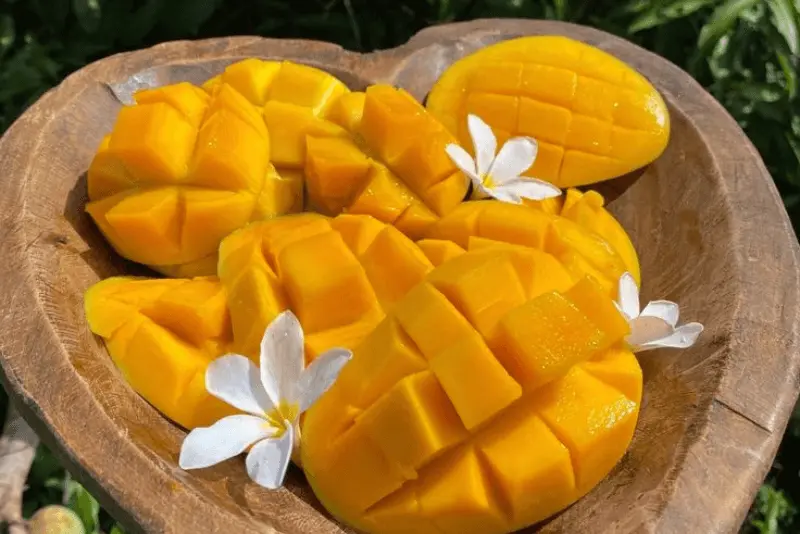As a pet owner, I understand that deciding your guinea pig’s diet can be tough. When summer arrives, a very delicious fruit for humans is mango. People usually ask, “Can guinea pigs eat mango?
The simple answer is yes, guinea pigs can eat mango in moderation, along with other tasty and healthy fruits. Mangoes are a rich source of vitamins A, C and potassium. However, they also contain a high amount of sugar and calcium that is not beneficial for guinea pigs.
In this article, we shall discuss the benefits, risks, and more about mangoes. Can it be beneficial for guinea pigs? Can they eat mango skin and more?
Benefits of Mango for Guinea Pigs
Mangoes offer several health benefits for guinea pigs when given in moderation:
High Vitamin C Content
Vitamin C is an important part of guinea pigs’ food. Mangoes are an excellent source of this essential nutrient. Vitamin C is super important for making collagen, keeping joints healthy, and supporting their overall immune system.
Do you Know?
Vitamin C is helpful to maintain your Pigs healthy skin, a shiny coat and their well-being.
Low in Calcium Oxalate
Mangoes have a low calcium oxalate content that reduce the risk of urinary tract issues such as stone formation. This makes them a safer option compared to high oxalate fruits.
Rich in Antioxidants
Mangoes contain powerful antioxidants like beta-carotene and other carotenoids. These antioxidants help neutralize free radicals, reducing oxidative stress and support chronic diseases. This can contribute to overall well-being in guinea pigs.
Lower in Calories
Mangoes have some calories, but they are lower in calories than some other fruits that guinea pigs like to eat. Even though they are low in calories and have natural fruit sugars, it is important to give them in moderation to avoid obesity and upset stomach.
Digestive Health
The fiber content in mangoes contributes to healthy digestion in guinea pigs. Fiber aids in maintaining regular bowel movements, preventing constipation, and supporting a well functioning and healthy stomach system.
Heart Health
Mangoes are a rich source of potassium that plays a crucial role in maintaining blood pressure. Introducing this natural source of an essential nutrient into their diet is necessary for their blood vessels.
Mangoes contribute positively to the guinea pigs’ cardiovascular systems. Guinea pigs not only relish a delicious treat but also have the potential to promote heart health, fostering a holistic sense of well being.
Enhanced Skin and Coat Health
Mangoes are a good source of vitamin A, essential for maintaining healthy skin and a shiny coat in guinea pigs. It contributes to the maintenance of a shiny coat and helps prevent skin dryness or flakiness.
Hydration
Mangoes are a great addition to your guinea pigs diet. They contain a lot of water which helps to keep your guinea pig hydrated. Plus, the natural sweetness of mangoes makes them a tasty and appealing treat for your furry friend. Just remember to offer mangoes in moderation as part of a balanced diet to keep your guinea pig healthy and happy.
Mango Is Good for Eye Health
Mango is essential for the eye health of guinea pigs, as it contains antioxidants such as zeaxanthin, which is good for eyesight. Vitamin A is also beneficial for guinea pigs eyesight and a lack of vitamins can lead to blindness.
Nutrition Facts of Mango for Guinea Pigs
100 grams of mango contain following nutrients that are given below:
| Nutrient | Amount |
|---|---|
| Water | 83.5 g |
| Energy | 60 kcal |
| Protein | 0.82 g |
| Total lipid | 0.38 g |
| Carbohydrate | 15 g |
| Dietary Fiber | 1.6 g |
| Sugars | 13.66 g |
| Calcium | 11 mg |
| Magnesium | 10 mg |
| Phosphorus | 14 mg |
| Potassium | 168 mg |
| Vitamin C | 36.4 mg |
| Vitamin A | 54 µg |
| Vitamin E | 0.9 mg |
| Vitamin K | 4.2 µg |
| Folate | 43 µg |
| Vitamin B-6 | 0.119 mg |
| Glucose | 2.01 g |
| Carotene, beta | 640 µg |
| Lutein + zeaxanthin | 23 µg |
Possible Health Risks of Mango
While mangoes are good for guinea pigs, there are some possible health risks when feeding an excessive amount of mangoes to them.
Excess Sugar Intake
Mangoes contain a high sugar content and excess sugar is not good for guinea pigs. A small quantity is acceptable for them but overfeeding can cause problems like obesity, diabetes and diarrhea.
Allergic Reactions
Some components in mangoes may cause allergic reactions in guinea pigs. The symptoms of allergic reactions include vomiting, stomach upset and sneezing, which are major allergic symptoms in your cavies. If you observe any major allergic reaction contact your vet to prevent any health issues.
Obesity Risk
Just like humans, obesity is one of the major diseases in guinea pigs, caused by an excessive intake of sugar. Moderation is the key to preventing obesity because guinea pigs have a limited ability to process high sugar. By limiting the sugar intake, you can also maintain their weight and prevent diseases caused by overweight.
Kidney Problems
If guinea pigs don’t get enough vitamin C along with calcium, it can lead to kidney and bladder stones. Even though calcium is important for their bones. It is crucial to adjust their diet as they grow older. This helps keep a good balance and lowers the chance of stones forming.
Digestive Issues
When guinea pigs try new foods like mangoes, it might sometimes cause tummy issues like diarrhea or gas. To prevent these problems, start with a lower quantity. Keep an eye on your guinea pigs while introducing new food. If you notice any digestion issues, consult your vet to keep your pigs healthy.
Pesticide Residue
When you want to offer mangoes to your guinea pigs, it is important to wash them properly because mangoes may have pesticide residue. Properly washing them can help guinea pigs avoid exposure to any harmful chemicals. It is important to get mangoes from a trustworthy store or from organic food stores to minimize pesticide issues.
Serving Size and Frequency of Mango for Guinea Pig

How Much Mango Can Guinea Pigs Eat?
Guinea pigs should not eat the whole mango because their diet is naturally higher in calories. Before giving fresh mango make sure to remove the seeds and cut it into small pieces to provide the necessary nutrients. Due to the high sugar content in mangoes, it’s best not to give them every day or in large amounts.
Follow a balanced diet with 80% hay, 10-15% fresh vegetables and only 5% fruits, including occasional treats like mangoes. Feed guinea pigs mangoes in small amounts like one or two slices per week to keep them healthy.
How Should I Feed my Guinea Pig with Mango?
Making meals for your guinea pig the right way is important. You can’t just throw a mango into their cage. Follow these steps:
- Choose a ripe and sweet mango. Avoid sour ones as they can cause health problems.
- Wash the skin properly to get rid of any pesticides or chemicals.
- Peel off the mango skin completely.
- Cut the mango into small pieces so your guinea pig can eat them easily.
- Put the mango in a container or bowl. Remove any uneaten parts after a few hours to avoid bacteria.
Remember, guinea pigs should not eat mango every day because it has a lot of sugars. Feeding them once or twice a week is enough. They also need hay and fresh water every day.
More About Guinea Pigs and Mango
Can Guinea Pigs Eat Mango Skin/Mango Peel?
No, guinea pigs should not eat mango skins because mango skin contains urushiol, an oily mixture with allergenic properties also found in poison ivy and oak. These compounds can be harmful and dangerous for guinea pigs. Mango skin is hard and may pose a choking hazard for guinea pigs.
Can Guinea Pigs Eat Mango Leaves?
Some guinea pigs can eat mango leaves, but it is not recommended to feed leaves to your guinea pigs because these leaves contain urushiol and are hard for guinea pigs. These leaves may cause choking in the throat of guinea pigs. That is why don’t give them to stay healthy and for the well being.
Can Guinea Pigs Eat Mango Seeds?
Guinea pigs should not eat mango seeds because they can be a choking hazard and may cause injuries, even leading to serious consequences or death. The seeds are too hard and slippery for cavies to handle safely.
Always remove the seeds from mangoes before giving them to guinea pigs. It is important not to offer any kinds of seeds to your pets to ensure their safety and well being.
Can Guinea Pigs Eat Dried Mango?
Guinea pigs should not eat dried mangoes because they are processed, and guinea pigs should avoid processed food. Dried mangoes can contain up to five times more sugar than fresh mangoes, and the dehydration process poses potential health risks, making them less suitable for guinea pigs.
It is recommended to offer them fresh fruits to minimize health risks. As of guinea pigs eat pumpkin and should not eat their leaves because they may cause choking in their mouth.
Quick Facts About Mango
Here are some facts about mangoes to eat guinea pigs:
- Mangoes belong to the Anacardiaceae family, which also includes cashews and pistachios.
- The scientific name of mango is Mangifera indica.
- India is the largest producer of mangoes globally that contribute about 40% of the worlds total production.
- There are thousands of mango varieties each with its unique flavor, aroma and size.
- Mango trees can grow up to 100 feet in height and may live for several hundred years.
- The mango fruit is a drupe that consist of a single large seed surrounded by juicy flesh.
- Mangoes are often called the “king of fruits” due to their delicious taste and rich nutritional profile.
- They come in various colors, including shades of green, yellow, orange, red and purple depending on the variety.
- Mangoes have been cultivated for over 4,000 years and have cultural significance in many regions.
- The mango tree is the national tree of Bangladesh and the fruit is the national fruit of India, Pakistan and the Philippines.
- Mangoes are enjoyed fresh in smoothies, salads, chutneys and various culinary dishes around the world.

FAQ’s
Can guinea pigs eat mangoes?
Yes, guinea pigs can eat mangoes. They provide essential nutrients and make for a tasty treat.
How often can I feed mangoes to my guinea pigs?
Mangoes should be given as an occasional treat, around once or twice a week, due to their sugar content.
Is mango a healthy treat for guinea pigs?
Mangoes are health beneficial for guinea pigs but only in moderation because they offer vitamins like C and A. Excessive consumption can lead to health issues.
Should I peel the mango before giving it to my guinea pig?
Yes, it is crucial to peel the mango and cut it into small, manageable pieces to avoid choking hazards.







